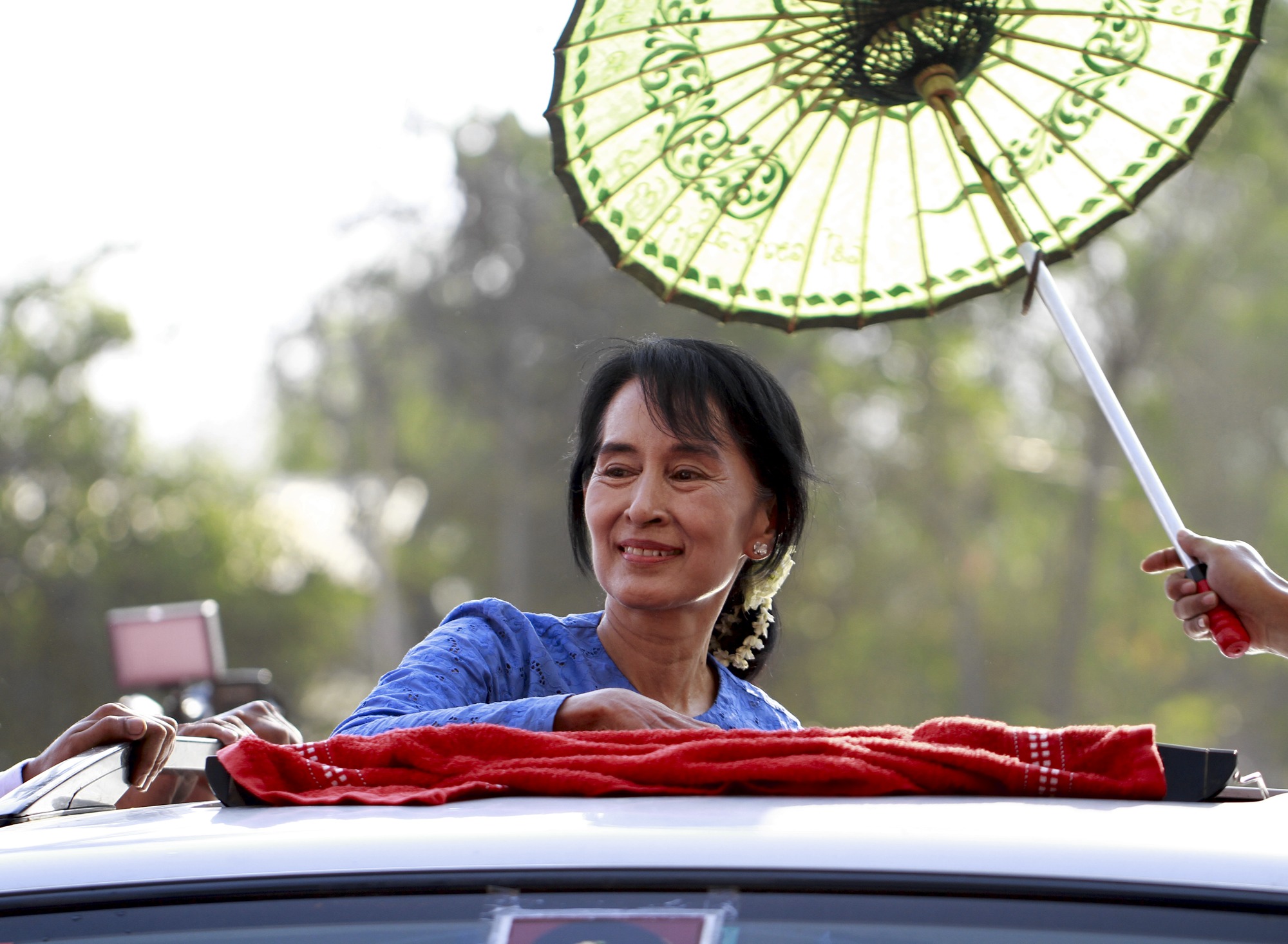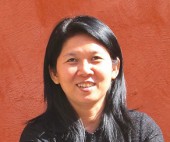Will Peace Reconcile Burma’s New Government and Army?
by Ma Thida / March 21, 2016 / No comments

National League for Democracy leader Aung San Suu Kyi during the 2012 campaign in Burma. Image via Wikipedia.
Though historic elections made headlines, the road to a peaceful turn of power, and a peaceful future, is proving to be fraught in Burma.
The long transition of power since last November’s election makes the people of Myanmar increasingly concerned regarding the lessening possibility of essential transition from military-dominated to civilian-dominant government. Because of constitutional constraints, Aung San Suu Kyi’s presidency may not be easy: the military may continue to hold power within all three pillars of government, by holding twenty-five percent of legal but non-legitimized seats in the parliaments, and holding seats in three important ministries, which control most of executive and judiciary powers.

- Literature is an echoing voice of people’s thought. Along with its people, Burma’s literature and media have suffered greatly during five decades of censorship. The majority of Burma’s population are voiceless, and many untold stories are yet to be discovered by local or international writers and journalists. Here, let’s try to find out and listen to what problems people are feeling, thinking, and facing regarding freedom of expression in their everyday lives in Burma.

- Ma Thida is a Burmese human rights activist, writer, medical doctor, and former prisoner of consciousness. In 1993, she was sentenced to twenty years in Burma’s Insein Prison for actively supporting the Nobel laureate Aung San Suu Kyi. She served six years of her sentence, largely in solitary confinement, and was released through the efforts of Amnesty International and PEN International. She has published nine books in Burmese and English, including The Sunflower (1999), The Roadmap (2011), and Sanchaung, Insein, Harvard (2012), a memoir. Ma Thida is currently president of PEN Myanmar.
The 2008 constitution states that the President shall appoint the Commander-in-Chief of the Defense Services with the proposal and approval of the National Defense and Security Council (NDSC). But current negotiations of power transfer are between commander-in-chief Min Aung Hlaing and elected party leader Aung San Suu Kyi. The three transition meetings between them tell the story of hard and heated negotiations on power sharing between new civilian-dominant government and army.
At the same time, both locals and foreigners have started talking about their concerns regarding the capacity of the newly elected (but long-time oppositional) parliament and government. New arrests of students’ supporters and heavier charges placed on students on trial; violent attacks on antidrug activists in Kachin state; almost-daily seizures of enormous amounts of yaba pills but failure to arrest the owners; denial of government responsibility to respond to new parliaments by current and outgoing government ministers; and secret bonds of some new business between state ministries and their cronies just after last year’s election are the stuff of the daily news, and are discussed over breakfast. This atmosphere gives the people of Burma less and less hope of genuine reconciliation between the military and civilians.
In August 2015, the Nation-Wide Ceasefire Agreement (NCA) between eight ethnic armed forces and the state military was established, and the NCA text was ratified by parliament. However there are eleven more ethnic armed forces (four out of those are recognized as combatant), which did not sign the NCA. Among those non-signatories, some forces are union level, some state level and some, are especially combatant. These combatant forces are rather new (formed three years ago) but have quickly grown and are well equipped with up-to-date weapons, which are usually made in China. Nine of those non-signatories are members of the United Nationalities Federal Council (UNFC). The Myanmar Peace Center (MPC), founded in 2012, is an established body for facilitating technical assistance to the peace process. The MPC was present, and delt with some UNFC leaders. Since divisions between signatories and non-signatories are widening, some non-UNFC ethnic forces accused the MPC of giving legitimacy to UNFC, while UNFC accused the state military of using the NCA as a ‘military and political weapon. Recently in Shan state, fighting between the Restorative Council of Shan State (RCSS), a signatory, and the Ta’ang National Liberation Army (TNLA), a non-signatory, pushed thousands of people out of their homes to become Internationally Displaced Persons (IDP).
Indeed some ethnic armed forces believe their organizations are totally independent and cannot be controlled by parliament nor government. Some of those forces are also fighting each other, either physically or ideologically. When a ceasefire agreement is the topic to discuss, most of them are just as concerned about their territory as the state military. After four years’ experience of ceasefire negotiations, the Union Peace Conference was held in Naypyidaw in early January 2016. On the grounds of free discussion, most of the groups who were invited spoke frankly about what they felt, thought and envisioned. Future power sharing among ethnic peoples, including the Bamar majority, was one of the most popular topics. The state military’s centralized federalism was also a strong point of discussion since the military still holds most of the state’s power. But national reconciliation between the military and civilians, and among different ethnic groups was ignored.
State military considers itself to be the guardian of the state as a whole, since ethnic armed forces could barely guard their limited territory. This concept of being the ‘guardian’ of the state gave birth to the National Defense and Security Council (NDSC). It is the highest decision-making body that has the authority to declare national emergency for the military to take charge of all government’s power. It includes eleven members: six are from the state military and five are from the civilian government, including the President and the Foreign Minister. Given this situation, Aung San Suu Kyi and NLD should make the community watching the government the true guardian of the state and the state military a the part of government, not an independent organization which tries to control both parliament and government.
Many experts have pointed out that peace can only be established and sustained by political negotiation, not by territory sharing after ceasefire. In this case, the role of state military is limited. Political negotiation can only be done by the new government, which has its full legitimacy and mandate. Aung San Suu Kyi is still a figure who must win trust from all different ethnic and political groups. Building trust is still a key to making a successful negotiation. For that reason, future peace process might be still promising. And if there will be no peace, there will be neither development nor democracy in the future. That is why military and the new government should look to the peace process as their key channel for reconciliation.




